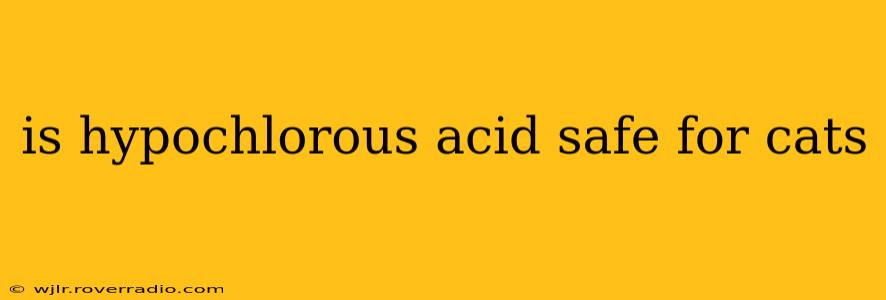Is Hypochlorous Acid Safe for Cats? A Comprehensive Guide
Hypochlorous acid (HOCl) is a naturally occurring compound found in the human body's immune system. It's also increasingly used in various cleaning and disinfecting products, sparking questions about its safety around pets, particularly cats. The short answer is: it's complicated. While dilute solutions of HOCl are generally considered safe when used correctly, there are crucial factors to consider before using any HOCl-based product around your feline friend.
Understanding Hypochlorous Acid:
HOCl is a powerful disinfectant that effectively kills bacteria, viruses, and fungi. Its effectiveness stems from its ability to disrupt the cell walls of these microorganisms. The key to its relative safety, compared to harsh chemicals like bleach, lies in its gentle nature. Once it neutralizes pathogens, it breaks down into water and oxygen, leaving behind minimal residue.
However, the concentration of HOCl is critical. High concentrations can be irritating and even harmful to both humans and animals. Products marketed as "hypochlorous acid" for pet use must be carefully formulated to ensure the concentration is safe for animal skin and mucous membranes.
What are the potential dangers of Hypochlorous Acid to cats?
While dilute, properly formulated HOCl is generally considered safe for topical application on cat skin in small amounts, several dangers need careful consideration:
- Ingestion: If your cat ingests even a small amount of HOCl solution, it could cause gastrointestinal irritation, vomiting, and diarrhea. This risk is significantly higher with higher concentrations.
- Eye and Skin Contact: Direct contact with concentrated HOCl solutions can irritate the eyes and skin, leading to burning, redness, and discomfort. Even dilute solutions can cause irritation in sensitive areas or if left on for prolonged periods.
- Inhalation: While less likely, inhaling HOCl mist (especially from a spray bottle) can irritate the respiratory system.
- Product Formulation: Not all products labeled "hypochlorous acid" are created equal. Some products may contain additives or impurities that could be harmful to cats. Always thoroughly research the product's ingredients and ensure it's specifically designed for pet use.
Can I use Hypochlorous Acid to clean my cat's wounds?
This is a question that requires a resounding "Maybe, but consult your veterinarian first." While some veterinarians may recommend dilute HOCl solutions for cleaning minor wounds in cats, this should never be done without professional guidance. Using the wrong concentration or applying it incorrectly could worsen the wound. Your vet can assess the severity of the wound and recommend the appropriate cleaning method, which may or may not include HOCl. Improper wound care can lead to infections, which are far more dangerous than any potential irritation from HOCl.
Is Hypochlorous Acid safe to use around cats for general cleaning?
This depends heavily on the product and its concentration. Dilute, pet-safe formulations of HOCl can be used for general cleaning in areas your cat frequents after your cat has left the area and the area has thoroughly dried. Ensure proper ventilation to avoid any potential inhalation issues. Always thoroughly rinse surfaces after cleaning with HOCl. If your cat is prone to licking surfaces, choose pet-safe, non-toxic cleaners specifically formulated for use around pets, as a precautionary measure.
What if my cat accidentally comes into contact with Hypochlorous Acid?
If your cat comes into contact with HOCl, immediately rinse the affected area with plenty of clean water. If the contact involves the eyes, rinse thoroughly for at least 15 minutes. If your cat shows any signs of distress (vomiting, diarrhea, respiratory issues), immediately contact your veterinarian or an emergency animal hospital.
In conclusion, while dilute, properly formulated hypochlorous acid can have a place in pet hygiene, caution and informed decision-making are paramount. Always consult your veterinarian before using any HOCl-based product on or around your cat, particularly for wound care. Prioritizing your cat's safety and well-being is the utmost priority. Choose pet-safe cleaning products whenever possible to minimize potential risks.
